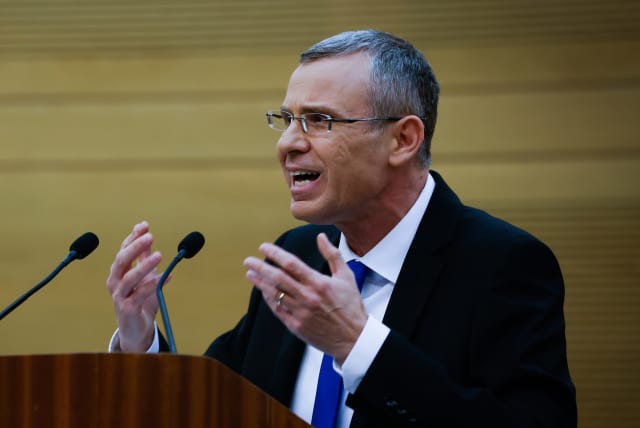Despite political challenges, Israel must remain united to bring hostages home - editorial

There will be a time to debate the future of Israel’s judiciary. Yet right now, the priority must be victory on the battlefield, the safe return of hostages, and the protection of citizens.
As leaders from the coalition met on Sunday to discuss the dismissal of Attorney-General Gali Baharav-Miara and the resumption of the controversial judicial reform, this has raised old tensions that have been simmering for over a year under the shadow of war.
The meeting came after Justice Minister Yariv Levin, who attended it, accused judges in the High Court of Justice over the weekend of “taking advantage” of the war in order to “continue taking over authorities of the Knesset and government,” and warned that “this cannot continue.”
Levin’s accusations came in response to a High Court decision on Thursday to set January 16 as the deadline for the Judicial Selection Committee – which Levin chairs – to elect a permanent chief justice.
At a moment when Israel faces some of the most pressing and dire challenges in its modern history, revisiting the topic of judicial reform would be an act of recklessness.
While the state wages war against Hamas in Gaza, contends with Hezbollah in Lebanon, manages escalating tensions in Syria, and navigates the unresolved crisis of hostages, the prospect of reopening a bitter domestic debate threatens the very unity needed for survival.
Notably, the last time judicial reform was forced onto the national agenda, the country teetered dangerously close to civil chaos. Israel’s enemies, ever watchful, seized that internal division as an opportunity to strike. To repeat such a mistake now would invite catastrophe.
Unparalleled strain
Israel’s current state is one of unparalleled strain. The war in Gaza is ongoing, with soldiers risking their lives and hostages still unaccounted for. Hezbollah, emboldened and battle-hardened, lurks on the northern border, testing Israel’s resilience with skirmishes and rocket fire. Syria remains an unpredictable threat, with Iranian proxies still dangerous in their foothold just beyond our doorstep, despite Israel’s military successes.
Add to this the political and legal turmoil surrounding Prime Minister Benjamin Netanyahu’s corruption trial, and you have a perfect storm.
In such a climate, any attempt to reignite a judicial reform – a move that last year fractured Israeli society and paralyzed the economy – would be an unforgivable distraction and a gift to those who wish us harm.
The bitter memories of 2023’s judicial reform crisis are still fresh. What began as a government initiative to reform the judicial system quickly spiraled into one of the deepest rifts in Israel’s history. Hundreds of thousands of Israelis took to the streets for months; families, workplaces, and communities found themselves split along ideological lines.
The crisis not only undermined national morale but also weakened critical institutions, with military reservists threatening to refuse service and investors pulling capital out of the economy.
Enemies were paying close attention. Hamas and Hezbollah interpreted the unrest as a sign of Israeli weakness. Iran’s proxies in Yemen and Iraq likewise sought to exploit this fracture, believing the country too distracted and divided to respond effectively. Indeed, one of the lessons of October 7 is that when Israel appears weak and divided, its adversaries see opportunity. On that fateful day, Hamas launched a brutal and unprecedented attack, capitalizing on years of underestimation and a mistaken belief that Israel could not respond cohesively.
For months now, Israelis have demonstrated extraordinary resilience. Families of hostages have turned their grief into a rallying cry for unity. Citizens from across the political spectrum have donated their time, resources, and expertise to support the war effort. Our economy, though bruised, is holding firm thanks to the sacrifices of workers and businesses alike. This hard-earned cohesion must not be squandered.
Revisiting the notion of a judicial reform now would undo this unity and risk alienating the very people who have carried Israel through its darkest hours. The thousands of citizens both in the South and North who have yet to return to their homes after 14 months should be a greater priority.
We cannot allow history to repeat itself. If a judicial reform was to return to the political agenda now, the ensuing backlash could unravel the fragile unity that has allowed Israel to fight back on multiple fronts. No responsible government should risk such division while the nation is at war.
There will be a time to debate the future of Israel’s judiciary. Yet right now, the priority must be victory on the battlefield, the safe return of hostages, and the protection of citizens. These are the issues that matter. These are the challenges that demand every ounce of Israel’s focus and energy.
Jerusalem Post Store
`; document.getElementById("linkPremium").innerHTML = cont; var divWithLink = document.getElementById("premium-link"); if (divWithLink !== null && divWithLink !== 'undefined') { divWithLink.style.border = "solid 1px #cb0f3e"; divWithLink.style.textAlign = "center"; divWithLink.style.marginBottom = "15px"; divWithLink.style.marginTop = "15px"; divWithLink.style.width = "100%"; divWithLink.style.backgroundColor = "#122952"; divWithLink.style.color = "#ffffff"; divWithLink.style.lineHeight = "1.5"; } } (function (v, i) { });

